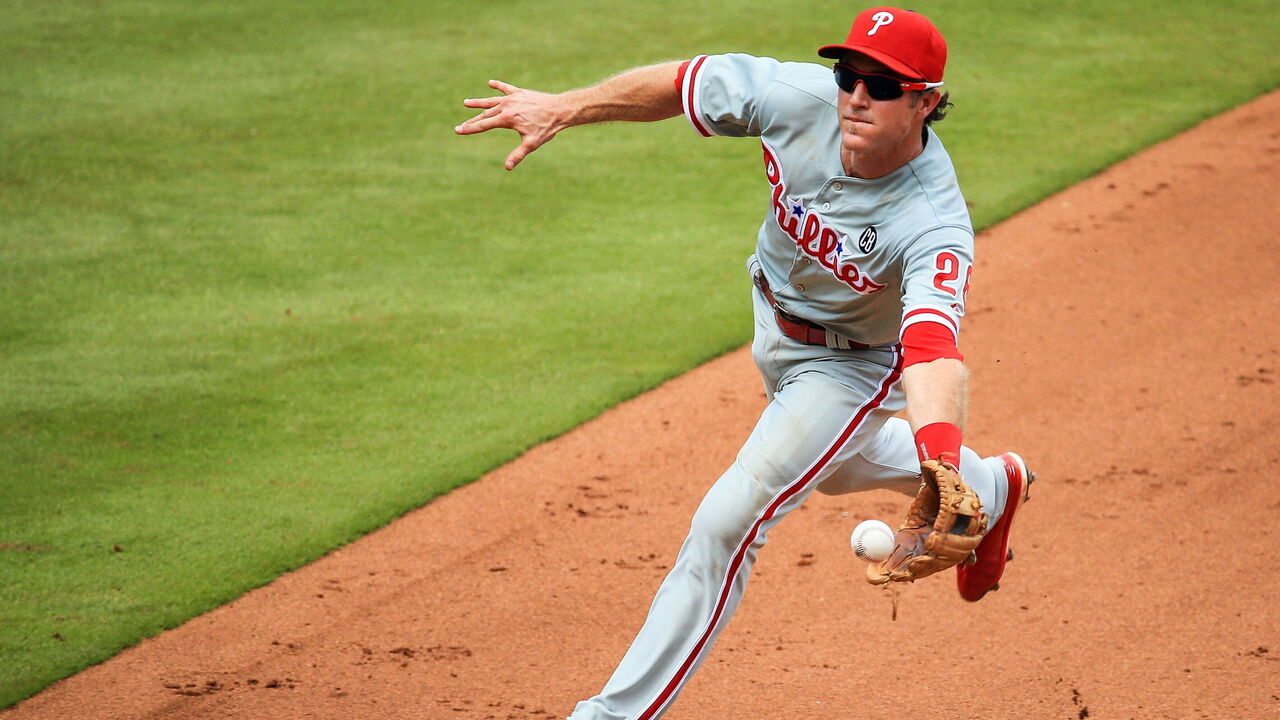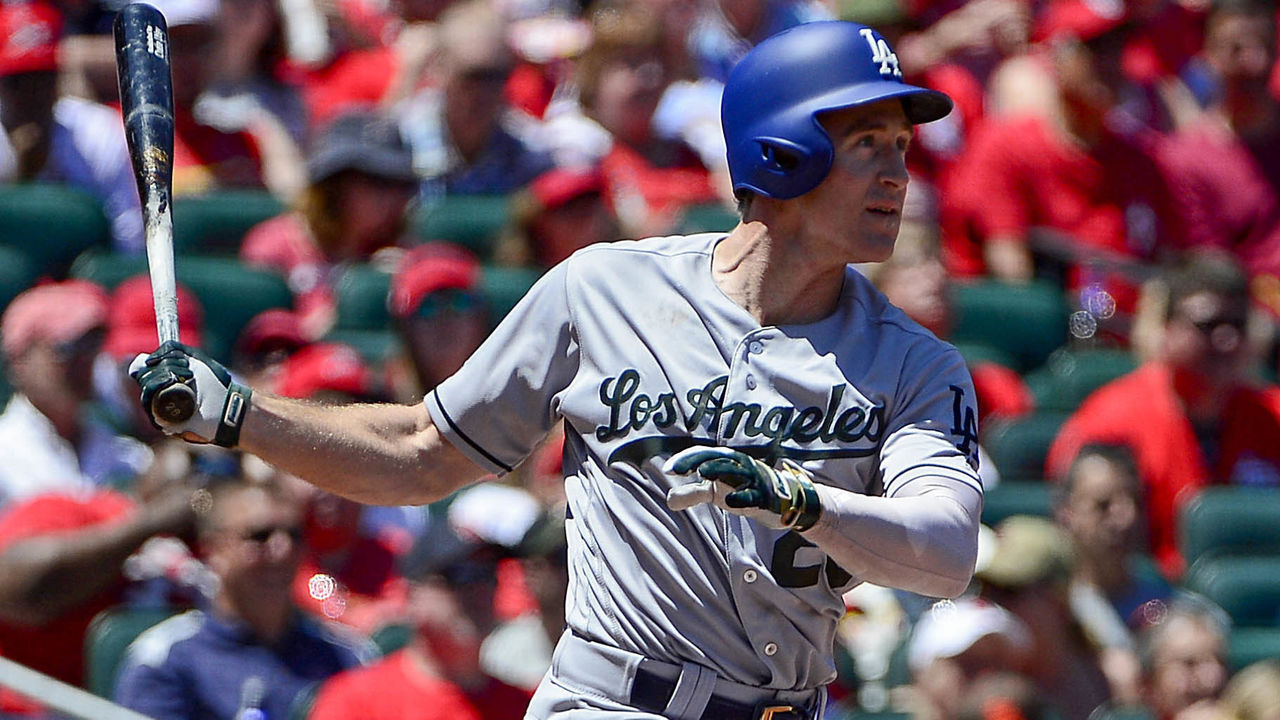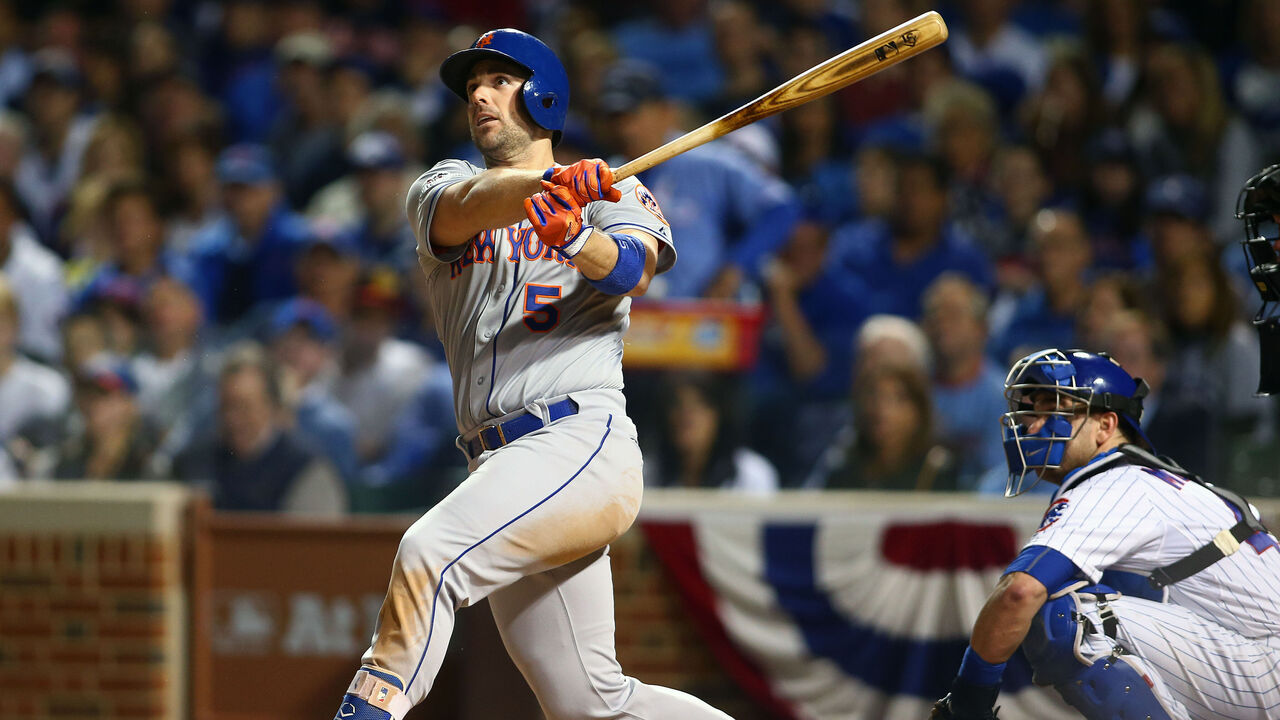2024 HOF preview: Utley, Wright present intriguing cases
With the Baseball Hall of Fame's class of 2024 announcement approaching, it's time to review this year's ballot. Today, we break down two first-time candidates and longtime rivals whose cases - if they exist - will need plenty of time to grow.
Note: All WAR figures from Baseball Reference unless otherwise noted.
Chase Utley

Position: 2B
Years: 2003-2018
Teams: Phillies, Dodgers
JAWS: 56.9 (12th at 2B)
WAR: 64.5 (15th)
Year on ballot: 1st
| GP | BA | OPS | H | HR | RBI | SB |
|---|---|---|---|---|---|---|
| 1937 | .275 | .823 | 1885 | 259 | 1025 | 154 |
Of all the stars on the great late-aughts Phillies teams, none personified Philadelphia quite like Chase Utley. He was their hard-nosed soul, winning fewer individual awards than some of his teammates but always leading them to success. His peak was short and lacked round numbers but was still incredibly impactful. While not a first-ballot lock, he's one of the more intriguing newcomers to the ballot in recent memory.
After a star-studded college career at UCLA, Utley was selected by the Phillies 15th overall in the 2000 draft. It took him only three years to reach the majors, and he announced his presence in style, belting a grand slam for his first big-league hit during his first start. Still, he wouldn't secure a full-time spot until 2005 when he finally wrestled the keystone away from Plácido Polanco.
That began his incredible run as baseball's premier second baseman. Over his first six full seasons, Utley hit .298/.388/.523 (133 OPS+) while averaging 27 homers, 95 RBIs, and 15 steals a year. He scored 100-plus runs in four of those campaigns, including a National League-best 131 in 2006 - the only time he'd lead a major offensive category - and tallied 115 defensive runs saved (DRS) for good measure. During that stretch, only Albert Pujols accrued more WAR than Utley's 45.5.
With Utley leading a talented, mostly homegrown core that included his double-play partner Jimmy Rollins and slugger Ryan Howard, the Phillies ended a 14-year playoff drought in 2007 with their first of five straight NL East titles. They won the World Series the following year, beating Tampa Bay in five games. Utley hit just .175 in the series but belted two homers and made one of the great defensive plays in Fall Classic history late in the clinching Game 5:
The Phillies made it back to the World Series in 2009 but lost to the Yankees in six games, although it was hardly Utley's fault: He tied Reggie Jackson's single World Series record with five home runs and had two multi-homer games in the defeat.
Utley remained a quietly consistent hitter into his mid-30s but had trouble staying healthy at the end of his career. He played in only 115 and 103 games during the final two years of the Phillies' NL East reign and had just one All-Star season over the back half of his career. Utley approved a trade to the Los Angeles Dodgers during a difficult 2015 campaign and spent his final years with his hometown club, helping L.A. win the 2017 NL pennant as a backup.
To some degree, Utley is a perfect example of what a modern Hall of Famer could look like, built on a peak that was short but remarkable. For some voters, that may not be enough.
Utley's shorter career cost him important traditional counting numbers, such as 2,000 hits and 300 home runs, not to mention his lower .275 average. The hit total is critical, as a player with less than 2,000 hits has never been voted in since modern Baseball Writers' Association of America elections began in 1966, and only one expansion-era (since 1961) player with less than 2,000 - Tony Oliva - has made it in at all.

Utley made up for those shortcomings, though. His .358 OBP is 25th all-time among second basemen with at least 7,000 plate appearances, mitigating the lower average. The low hit total is a lot easier to overlook when you add Utley's baseball smarts as an elite baserunner and defender to his dominant offensive peak. As FanGraphs' Jay Jaffe notes, Utley's currently tied with Mookie Betts for the third-highest WAR among players with fewer than 2,000 hits.
Although he never won a Gold Glove, Utley's one of the greatest defensive second basemen ever. He ranks seventh at the position in fielding runs (131), which spans all eras, and second in defensive runs saved since 2003 (123). One of just 20 players with 100 career DRS at any position, Utley also owns five of the top 30 single-season DRS totals at second.
Utley's non-traditional Hall of Fame case appeals to younger and public voters, and the tracker has been his friend so far: he's been named to 47% of ballots in the tracker to date. That leaves him just behind the final tracker total of Carlos Beltrán - who, like Utley, needed time to grow his case - in his debut last January (Beltrán was at 47.4% in last year's tracker, and 46.5% on the final ballot).
Not only is Utley safe from 5%, but he may also suddenly be set up for a much quicker rise to Cooperstown than many might have expected. His final percentage of votes will likely dip, but probably not by much. Utley's future here is bright - good news for the Hall of Fame.
David Wright

Position: 3B
Years: 2004-2018
Teams: Mets
JAWS: 44.3 (26th at 3B)
WAR: 49.2 (28th)
Year on ballot: 1st
| GP | BA | OPS | H | HR | RBI | SB |
|---|---|---|---|---|---|---|
| 1585 | .296 | .867 | 1777 | 242 | 970 | 196 |
For an all-too-brief period, David Wright was the NL's best third baseman and seemed to be flying toward Cooperstown before a back injury ended his career prematurely. Did he do enough in that short time to warrant serious consideration?
The Mets selected Wright 38th overall in 2001 as compensation for Mike Hampton signing with the Rockies, continuing a transaction tree that dated back to 1967. He made his big-league debut on July 21, 2004, and immediately supplanted Ty Wigginton (who was traded nine days later) at the hot corner.
Wright earned downballot MVP support in 2005, his first full season, and led the Mets to 97 wins and an NLCS appearance the following year. In August 2006, a month after his first All-Star nod, the Mets handed him a six-year, $55-million extension.
He was only getting started. In 2007, Wright became only the second Met and third primary third baseman to post a 30-30 season, set career highs in virtually every category, and was second in the NL to Albert Pujols in WAR (8.3). He finished fourth in NL MVP voting and won the first of his two Silver Slugger and Gold Glove Awards.
Going by WAR, Wright was the second-most valuable third baseman (39.6) in the majors from 2006-2013, trailing only Adrián Beltré. His power numbers dipped a bit with the team's move to Citi Field, but he still averaged 23 homers and posted a .900-plus OPS four times, only dropping his OPS below .837 once. Alas, he couldn't lift the Mets by himself: New York blew late division leads in 2007 and '08 before starting a run of six straight losing seasons.
After finishing a personal-best sixth in NL MVP voting in 2012, Wright signed an eight-year extension. He'd have his final great season in 2013 at age 30 despite missing a chunk of time with mounting injuries. He played in 134 games in 2014 but hit just eight homers with a .698 OPS after a shoulder injury messed up his swing.
Early in 2015, while already out with a hamstring injury, Wright was diagnosed with spinal stenosis, a serious back condition that threatened his career. He returned to the Mets in August and contributed to their NL East title and NL pennant run. The Mets lost the World Series - but Wright still got his moment on the biggest stage, hitting a homer and tallying four RBIs in Game 3.
From there, the injuries took over. Back and shoulder surgeries ended Wright's 2016 season after only 37 games. He missed the entirety of the 2017 campaign and didn't get into a minor-league rehab game until August 2018. The pain was constant, and his on-field future was clearly in doubt.
The Mets activated Wright for two final games at Citi Field late in 2018, where he received an emotional send-off from the Flushing faithful. After that, and an insurance settlement to cover the rest of his contract, he officially retired.
Like Utley, Wright's Hall of Fame case is built largely on an unbelievable peak as the face of a franchise. Both fell short of key modern milestones, didn't lead in a major category, and lacked award recognition. But the comparison's not that simple.
Because he played only 77 games over his final four seasons, Wright's much further away from 2,000 than Utley is; he also fell short of 300 homers and 1,000 RBIs. If elected, Wright would instantly own the fewest games played and plate appearances among Hall of Famers who played entirely in the expansion era (since 1961) by a wide margin.
Since counting stats won't do it, his case rests largely on metrics. Wright's placement on the third base JAWS and WAR leaderboards, however, is a bit lower than one might expect given his peak: he's 26th in JAWS - just above Josh Donaldson, and far back of the average Hall of Famer - and 28th in WAR. Contemporaries who have passed him on both leaderboards include potential future inductees Nolan Arenado and Manny Machado and likely outsider Evan Longoria.
He does place 23rd in seven-year peak WAR (39.5), just behind Paul Molitor (a DH whose primary defensive position was third) and about four points back of the average. But to earn a spot in the Hall of Fame, he'd ideally be much closer to, if not above, the average score. Utley, for instance, is only one-tenth of a point behind the JAWS average at second, and five points above his position's mean seven-year peak WAR.
As the Mets' beloved captain, Wright's often called Flushing's answer to Derek Jeter, but his career looks more like that of another Yankees great. Don Mattingly is also a New York baseball icon who seemed to be cruising to the Hall before back injuries cut him down and left him well back of the standards at his position. Mattingly's No. 23 is retired by the Yankees, as Wright's No. 5 eventually will be by the Mets, but that honor will never guarantee anyone a plaque in Cooperstown.
Still, it would be a shame if Wright goes one-and-done on Tuesday. He's been named on 7.4% of public ballots to date, putting him on the bubble to drop off. His brief career was special enough to warrant at least one more year of consideration, even as one of baseball's ultimate "what-ifs."
Wright's position is the most underrepresented one in the Hall of Fame, and it can be argued that he's among the most notable omissions at the hot corner. There are several names ahead of him on the priority list, though, including Ken Boyer, Dick Allen, and Graig Nettles. Once they're all taken care of, perhaps an Era Committee can give Wright a longer look.